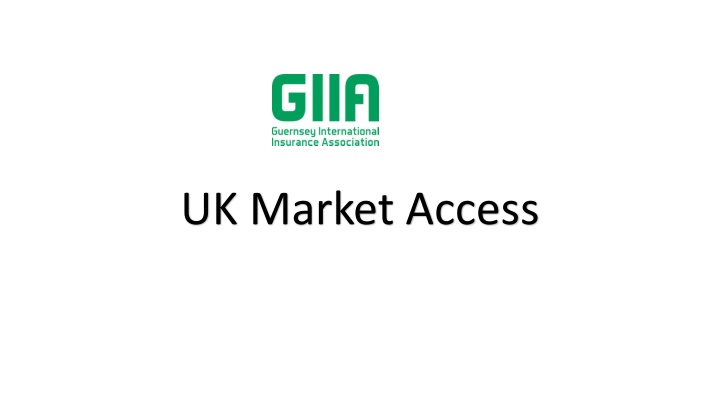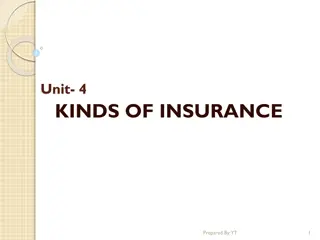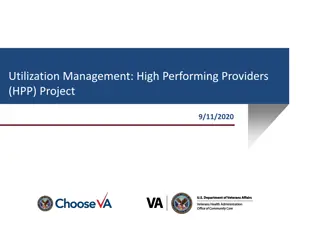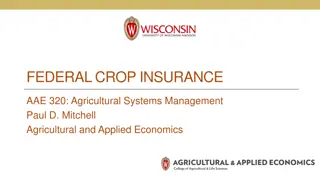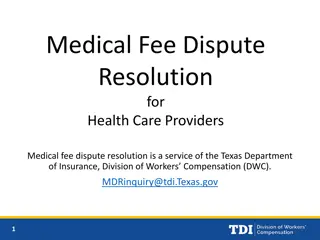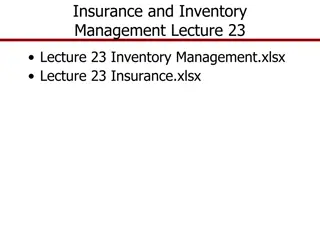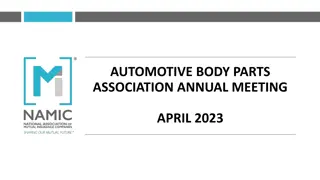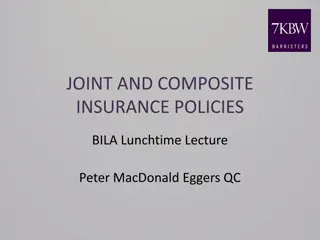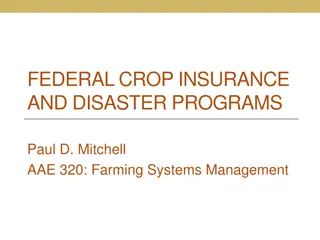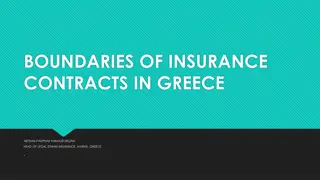Considerations for Guernsey Regulated Insurance Providers Issuing Policies in the UK
This presentation outlines key issues for Guernsey regulated insurance entities when issuing policies on a non-admitted basis in the UK. It emphasizes the differences between the regulatory regimes in Guernsey and the UK, highlighting challenges and recommendations while comparing solvency models, regulatory accessibility, and the impact on the competitiveness of Guernsey's insurance industry.
Download Presentation

Please find below an Image/Link to download the presentation.
The content on the website is provided AS IS for your information and personal use only. It may not be sold, licensed, or shared on other websites without obtaining consent from the author.If you encounter any issues during the download, it is possible that the publisher has removed the file from their server.
You are allowed to download the files provided on this website for personal or commercial use, subject to the condition that they are used lawfully. All files are the property of their respective owners.
The content on the website is provided AS IS for your information and personal use only. It may not be sold, licensed, or shared on other websites without obtaining consent from the author.
E N D
Presentation Transcript
Introduction The purpose of this presentation is to highlight the key issues that a Guernsey regulated insurance entity should consider when issuing policies on a non- admitted basis into the United Kingdom. This document has been compiled by members of the Association to assist fellow members of the Association but does not replace the need for specific legal advice. GIIA strongly recommends that any entities wishing to issue policies directly into the UK seek their own legal advice that will be specific to their circumstance and address their unique requirements. In providing this information GIIA does not accept any liability in relation to its use.
Background The UK has no express prohibition on non-admitted insurers or reinsurers. Rather, the UK regulatory regime prohibits the performance of 'regulated activities' within the UK by unauthorised firms. These include insurer activities such as effecting and carrying out contracts of insurance, and distribution activities such as arranging, advising upon, selling and administering contracts of insurance. A person who is acting in the course of business and who is not either authorised or acting with the approval of an authorised person, may not invite or induce another to engage in an investment activity (s.21 FSMA), which includes 'entering or offering to enter into an agreement the making or performance of which by either party constitutes a controlled activity . The beneficial differentiations that Guernsey has over the UK regulatory regime are: The solvency model is less onerous in terms of complexity and capital charges maintaining Guernsey s viability in respect of pure captive business and being sufficiently attractive for a domicile of choice for new captive or commercial business. However, the current solvency model can be unfairly penal for certain business and client structures and that has to be challenged on a case by case basis. The Guernsey Regulator is, normally, more easily accessible and amenable for consultation and the turn round of applications and change of control notifications are significantly quicker than for the PRA or FCA. Insurance entities are normally managed by professional management organizations extremely well versed in the Guernsey regulatory and legal obligations, hosting bespoke systems and with staff providing the full range of necessary skills essential for a complete seamless corporate service. In contrast, self managed UK entities will require premises and employees at least two of whom will have to be acceptable as approved persons to undertake controlled functions , at a significant cost and management. The process for insuring corporate risks, usually by a pure captive, is well understood and, because of the nature of the risks and the very limited number of transactions, should not represent any difficulty in complying with UK laws and regulations. Where entities are set up for the purpose of underwriting retail business to firms or individuals then the structure and processes are more convoluted in order to ensure that insurance business is not acting in breach of the statutes. The carrying out extends to claims handling, although administration of claims appears to be admissible so long as there are no decisions concerning settlement taking place in the UK, claims are received in Guernsey and settlement is paid from Guernsey. Seeking approval from the UK regulator for Guernsey resident insurance entities to freely market and transact insurance business in the UK, even restricted to non-statutory classes, will likely require Guernsey to adopt solvency, regulatory and consumer protection standards equivalent to the UK. If applied to the whole of Guernsey resident insurers it will immediately render Guernsey uncompetitive and unattractive to its traditional core business. The consequential loss of business and failure to attract new business will irreversibly reduce the number of insurance entities and number and size of insurance managers with the corresponding effect on employment, tax, regulatory infrastructure and hospitality spend.
Primary Legislation Guernsey insurance entities can underwrite risks in the UK provided that the following statutes are not breached: Financial Services & Markets Act 2000 Financial Services & Markets Act (Regulated Activities) Order 2001 (RAO) Financial Services & Markets Act (Financial Promotions) Order 2005 (FPO) In essence, these prohibit effecting or carrying out insurance or the marketing or promotion of such in the UK, unless authorized.
Financial Services & Markets Act 2000 Part II Section 19 Regulated and prohibited activities This section is referred to as the General Prohibition it states: (1) No person may carry on a regulated activity in the United Kingdom, or purport to do so, unless he is an authorised person; or an exempt person. Contravention of S.19 is an offence punishable by a fine and/or imprisonment. The FSMA, section 21, also contains restrictions on Financial Promotions and addresses issues such as communicating invitations or inducements to engage in investment activity (insurance falls within the description of investment activity), unless the communicator is authorised by the appropriate regulator or communication has been approved by such an authorised person. An FCA approved intermediary acting as intermediary for the insured would fulfil this requirement. A person who is acting in the course of business and who is not either authorised or acting with the approval of an authorised person, may not invite or induce another to engage in an investment activity (s.21 FSMA), which includes 'entering or offering to enter into an agreement the making or performance of which by either party constitutes a controlled activity'. Provisions in the FSMA legislation can deem regulated activities to be taking place in the UK (e.g., where there is a binding authority granted by an offshore insurer to a UK broker).
Financial Services & Markets Act 2000 The FCA Perimeter Guidance Manual (PERG) gives guidance on when authorisation is required, or exempt person status is available, including guidance on the activities which are regulated under FSMA 2000 and the exclusions which are available. PERG 5 (Insurance) 5.14.4. concerns whether certain activities are regulated. https://www.handbook.fca.org.uk/handbook/PERG/
Financial Services & Markets Act 2000 (Regulated Activities) Order 2001-RAO Part III Insurance Section 10 Effecting and Carrying out contracts of insurance This section sets out that effecting and carrying out a contract of insurance as principal is a specified kind of regulated activity.
Financial Services & Markets Act 2000 (Financial Promotions) Order 2005 (The FPO) Financial promotions fall into two categories: Real time a conversation is real time Non-real time. Article 26 of the FPO indicates that Section 21 of the FSMA does not apply to real time communication relating to relevant insurance activity, (effecting and carrying on contracts of insurance). Such communications must include: The full name of the Company Clear indication that the Company is incorporated in Guernsey. Clear indication that the Company is regulated in respect of its insurance business; That the Company is regulated by the Guernsey Financial Services Commission Whether any transaction falls within the jurisdiction of any dispute resolution scheme or compensation scheme. Such scheme must be clearly identified. The FPO sets out a number of exemptions in articles 24 to 26, which relate specifically to promotions relating to insurance activities, (effecting and carrying on insurance) which is otherwise prohibited under FSMA.
Key Elements It is understood that (like the position under the Guernsey Insurance Business Law in relation to Guernsey) if there is no physical presence or contact address of the non-admitted insurer in the UK (itself or through agents) nor targeted marketing to persons in the UK, this should not amount to carrying on regulated activities within the UK. As a result, effecting of contracts of insurance with persons in the UK via a website hosted in Guernsey, without activity in the UK, should be permitted on a non-admitted basis. The extent to which contracts of insurance lawfully effected on a non-admitted basis may be administered in the UK on behalf of the non-admitted insurer, e.g. collection of premium payments, claims handling activities, must be considered on a case by case basis and carefully managed. Purely administrative tasks should be able to be carried out in the UK but should not be extensive and should be done under a clear and specific contract where the control clearly remains in Guernsey. All underwriting activities including setting of premiums MUST be carried out in Guernsey. Confirmation of cover MUST be sent from Guernsey. Any policy documentation MUST be signed in Guernsey. An FCA regulated intermediary can approve the marketing material of a Guernsey insurer and this would bring the Guernsey insurer within the provisions of Section 21 of the FPO. Where business is being introduced by an FCA regulated intermediary, that intermediary should be acting on behalf of the customer not the Guernsey insurance entity. Arrangements should be documented in a Terms of Business Arrangement (TOBA). Claims can be administered by a third party claims administrator but final approval and settlement must be made in and from Guernsey. Advice is regarded as having been provided where it is received, a Guernsey insurer cannot therefore give advice. It can, however, give information about the policy and extent of cover provided.
